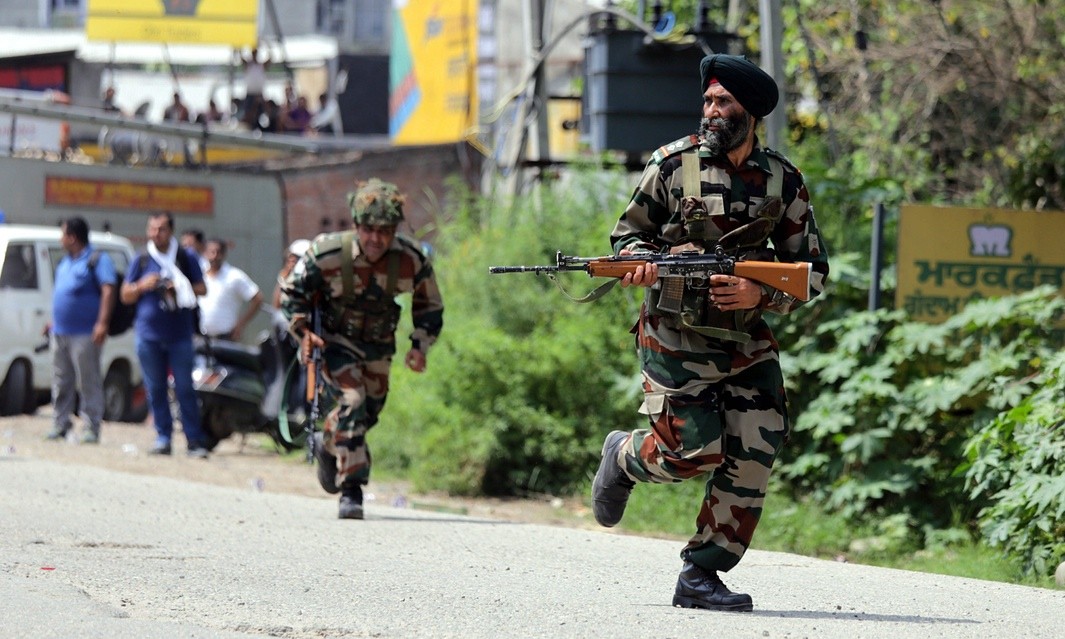
The recent attack has created another breach in the neighbours' relations

As Indian media relayed the Gurdaspur attack live, some ten kilometers from Pakistan, Pakistani media focused more on the Indian spy drone footage that the ISPR, military’s media wing, had released to the press when one such drone was downed by Pakistani soldiers posted on the border.
Questions were raised by the Indian media about the possible connection of the attack to Pakistan, given some eyewitness accounts, proximity of the attack site to the border, and the fact that there was a Hindu religious event in Indian-Kashmir, and the real target may have been that but tightened security diverted the attackers who were from outside Gurdaspur.
By this time, the Pakistani media had moved on from its India-is-spying-on Pakistan coverage and had also started discussing the Gurdaspur attack. Many of the analysts who came on TV spoke about the insurgencies in India and particularly the Khalistan movement. Pakistani social media accounts started trending #LiberateKhalistan and made it trend on top.
This scenario is a repeat of many similar insistences in the past, albeit with different characters, locations etc but the same theme. Some of them are bloodier, others lesser. And every time such a tragic incident takes place across the border in India, relations between these two nuclear armed countries deteriorate fast and are soon reset.
But earlier there was more hope than there is today, as India was more accommodating in forgiving Pakistan. Now that may not be possible, as the Indian Prime Minister Narendra Modi has a different constituency to answer to -- one that is Hindu nationalist.
It was only last month that a five point agenda was agreed between the prime ministers of both countries when they met on the sidelines of the Shanghai Cooperation Organisation Summit (SCO) in Ufa, Russia, of which Brazil, Russia, India, China and South Africa are a part.
The atmosphere at the meeting was described as hopeful by many in the media. Both countries agreed on closer cooperation especially on terrorism but following the Gurdaspur attack, none of that happened. Instead, Indian ministers even cancelled meeting with Pakistan’s High Commissioner. And this is just the beginning, experts feel.
"Modi led government will exude greater ‘firmness’ of resolve if there is another terror related incident credibly linked to the Pakistan’s deep-state, particularly after the Gurdaspur attack," says C Uday Bhaskar, a director at Society for Policy Studies, a think tank based in New Delhi, adding however that the scale of such terrorist act will matter. "If there is something similar to Mumbai… then all bets are off," he warned.
Indian home minister has already claimed that the attackers came from Pakistan, citing initial investigations.
And why are such accusations always hurled at Pakistan? Given that the country continues to turn a blind eye towards militant groups focused on India in general and Kashmir in particular, it is only understandable that India will blame its security failures on its neighbour that is known for harbouring such elements.
"It is the distorted security narrative that one spectrum of Pakistan’s ruling and military elites have internalised. This is the domain wherein India is the permanent, nay eternal threat to Pakistan," says Bhaskar explaining how this plays into the strategy of supporting terror groups and that stratagem is deemed kosher by the Pakistani leadership.
According to him, India also understands who the real leadership in Pakistan is.
"[In India,] Nawaz Sharif is perceived as the most credible political leader in Pakistan today. However, his constraints are also recognised especially in relation to the Pakistan Army. There is a realisation in India that on matters that are central to the bilateral talks viz. Kashmir, nuclear weapons and support to terror groups -- it is the GHQ and Muridke that has greater clout than the political spectrum in Islamabad," adds Bhaskar.
But is this realisation widespread in India and will it push Modi and his government to be easy on Pakistan going forward? Experts feel it is unlikely.
A few weeks before the July rapprochement in Russia, Prime Minister Modi had caused much controversy by saying that Pakistan was a nuisance and was spreading terrorism in India. Not only that, the Indian Defence Minister Manohar Parrikar had said that India will use terrorism to counter terrorism from other countries.
"India in the past would have considered a Pakistan it could ignore and not constantly watch its back. But With Modi [in the lead] there is growing belligerence" says Dr. Ayesha Siddiqa, renowned security analyst.
And this is why many fear for worse times ahead. "Pakistan was born ideological but India turning into one is a death knell for peace," adds Siddiqa.
Observers therefore feel that Pakistan does need to immediately clean its house and have a zero-tolerance policy towards militancy, but simultaneously India needs to be patient and not fall in a nationalist trap, and allow Hindu extremist ideology to dominate the Indian public narrative, because that will in turn only help strengthen those powers in Pakistan that profit from this enmity.